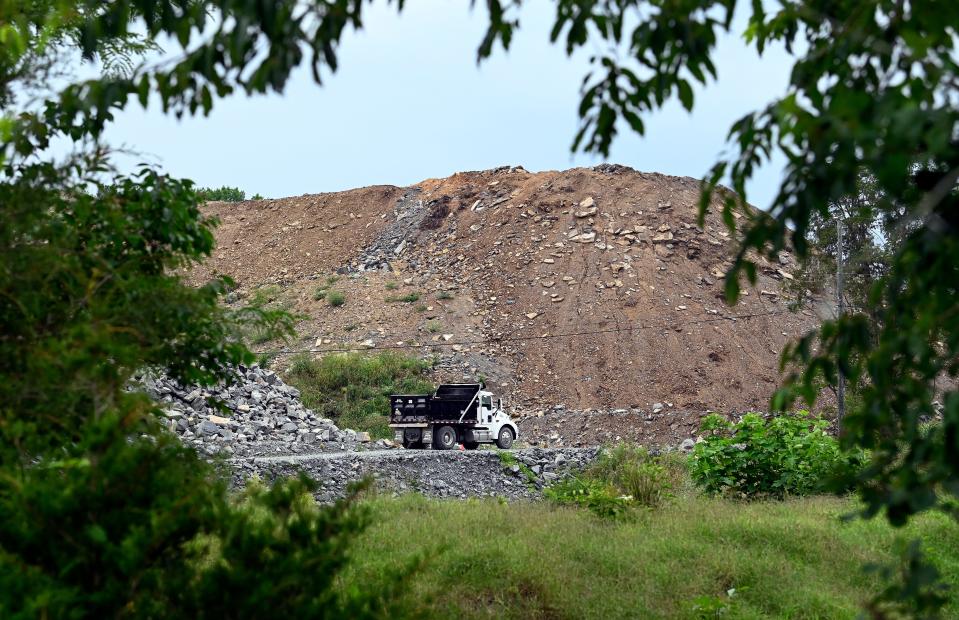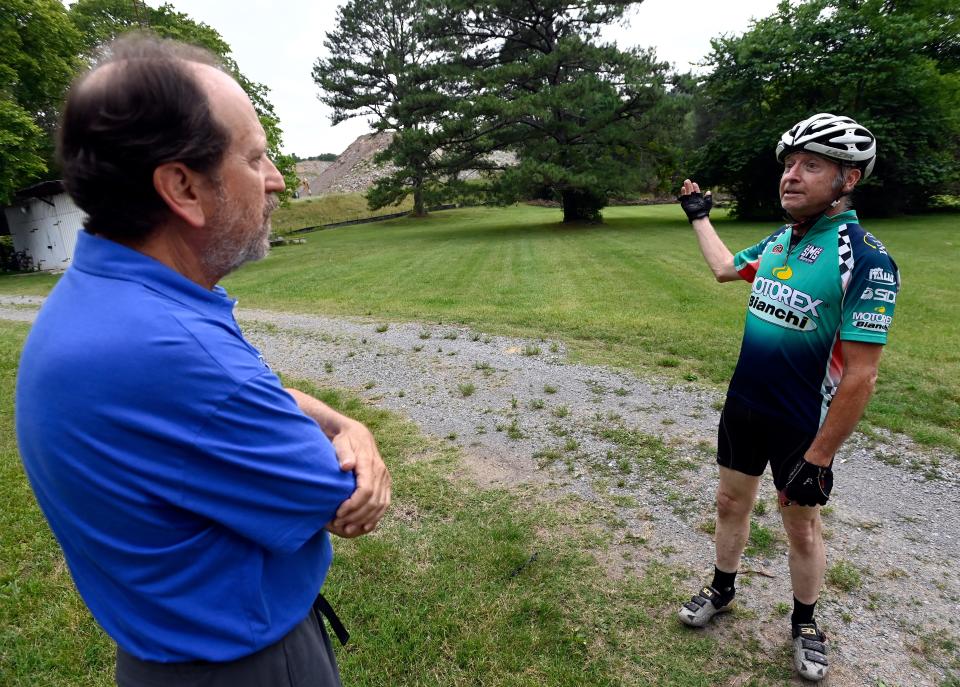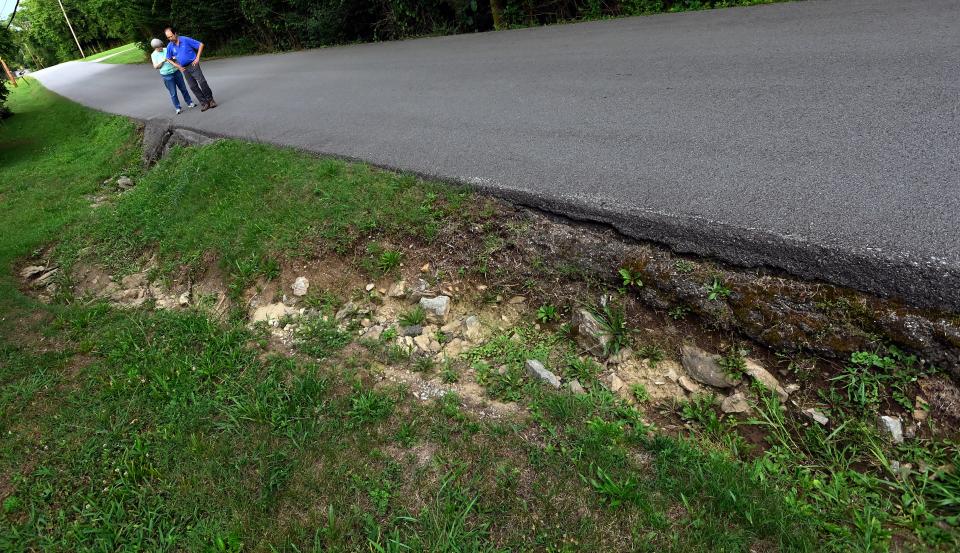On Nashville's outskirts, residents decry pile of construction fill known as 'Dirt Mountain'
Marks of development are commonplace in Nashville: craters that will become underground parking, heavy machinery that will reshape land to fit building plans. But what happens to all of that dirt?
Most Nashvillians likely don't know. Frank Canale needs only to look at the 200-foot mountain next door.
Over the last three years, dump trucks have made hundreds of trips down Ashland City Highway to dump fill from Nashville construction sites on what used to be a sloping knoll partly covered with trees on the western edge of Davidson County. The site's permits approve a man-made mound of fill material supporting a new road to a cellphone tower.
To surrounding neighbors, the pile is known simply as "Dirt Mountain."

Canale said the mountain's storm water runoff transforms his backyard of more than 30 years into a marsh during rainy seasons. He built a makeshift dam out of brush to stem the flow. Other neighbors said the dump trucks shed plum-sized shards of rock onto the busy road, posing safety concerns for drivers and bicyclists. Some chunks ended up in neighbors' yards, making routine lawn mowing an exercise in caution.
Environmental group Tennessee Riverkeeper filed a lawsuit against the property's owners in August, claiming silt-laden runoff from the site is polluting nearby Sulphur Creek, which drains into the Cumberland River. The suit also asserts that the mound of material excavated from construction sites makes the property an unpermitted construction and demolition landfill.
Property owners Ricky and Crystal Ray declined to comment through their attorney. They filed a response to the lawsuit Friday admitting to using excavated material from construction sites on the property but denying any violations or wrongdoing.
City and state regulators have said the site and its owners appear to be compliant with the site's general construction permit and stormwater pollution prevention plan. Tennessee Riverkeeper's lawsuit says government inspections are failing to identify problems and enforce corrections.

Tennessee Riverkeeper founder David Whiteside said storm water runoff from "poorly regulated" construction sites that do not use best practices is a "major pollution issue for the Cumberland River and the tributaries around Greater Nashville."
The nonprofit aims to hold developers accountable.
"(When) they get away with skirting regulations, it's just another subsidy to developers ... (who) are not paying the true cost of their development," he said.
Muddy water
Tennessee Riverkeeper Environmental Consultant Barry Sulkin said general permits require construction sites to prevent erosion and control sediment to minimize pollution. Regulations say storm water runoff shouldn't be cloudy or contain "suspended solids."
But the rules don't specify discharge limits.
"You can't violate the permit, per se, by putting out water that's too muddy," said Sulkin, a former chief of enforcement in the Tennessee Department of Environment and Conservation's water quality control division. "It's a ridiculous program, but it gives the appearance of regulatory coverage."

Sulkin has a video saved on his phone: Canale, whose property abuts the site, plunges a cup into a fast-moving storm drain next to his driveway. He retrieves a glass of water so choked with sediment it resembles chocolate milk.
That water drains under Ashland City Highway, through neighbors' yards and into Sulphur Creek, Sulkin said. Twice-weekly inspections required under the permit have recorded no issues.
"They just check the box every time that everything's fine, but if you go out there on a day when it's raining ... hard enough that water's running off in some volume, you'll see that everything is not fine," he said.
Sulkin said he followed the dump trucks to a construction site on Trinity Lane one day and observed dirt and broken-up concrete being loaded for transport to Dirt Mountain. The dump trucks stopped coming this summer after the nonprofit notified the Rays and the state of their intent to file a lawsuit and the site received media attention.
State regulators inspected the site on June 28, responding with a letter stating they found "no notable impacts" or unauthorized discharges from the site, and would thus continue to "monitor the site" but not pursue formal enforcement action.
The inspection report from June 28 lists several problems, including storm water management devices and basin designs that did not match the site plans and the absence of a required site assessment. The twice-weekly inspection reports also lacked necessary signatures.
Metro Nashville approved mass grading plans for the site, operating under the name RR Farms, in May 2020. Metro Water Services has received "ongoing complaints" about the project since then, according to spokesperson Sonia Allman, but "the site has remained in compliance with the approved plans."
The allowed grading materials — rock and dirt — were reflected in Metro Water Services' most recent inspection on Oct. 4.
What's next
When rain starts pouring, Reba Wittenmeier crosses her fingers.
Her home since 1969 lies across Ashland City Highway on the receiving end of the under-road storm water drains. Video clips on her phone show streams of turbid water criss-crossing her property on their way to Sulphur Creek. The flooding has increased since the grading started, she said.

In June, Wittenmeier walked along Old Hydes Ferry Pike and pointed out areas where flooding has eaten away the soil supporting the road, leaving behind a rough edge of crumbling asphalt. She reported the erosion around the culvert to hubNashville, she said.
Replacing the culvert is "on the Stormwater Maintenance Division’s radar as a future project," according to Allman.
Tennessee Riverkeeper's lawsuit asks the court to find the Rays in violation of water protection regulations, impose an injunction to stop future site work, require removal of "illegally dumped soil, rocks and other material" and assess civil penalties for each violation.
The Rays' response argues their site permit and stormwater pollution prevention plan — and their compliance with them — speak for themselves. The nonprofit cannot show the "presence of ongoing violations," which "wholly occurred in the past."
They also argue any relief is moot "in light of corrective measures previously and currently being undertaken" at the site, though those measures are not specified. If Tennessee Riverkeeper did suffer harm, the filing states, it was due to "their own lack of diligence and negligence, or the lack of diligence and negligence of others."

Canale said he feels government agencies ignored him and others who complained about the project.
"Nobody cares about us out here," he said. "We are six miles from the county line."
For Canale, there is no remaining best case scenario. The damage is done.
"If I could say one thing to the people of Nashville: It happened here, it can happen in your neighborhood, too," he said. "Don't think it won't."
This article originally appeared on Nashville Tennessean: Nashville residents decry pile of construction waste and water runoff

